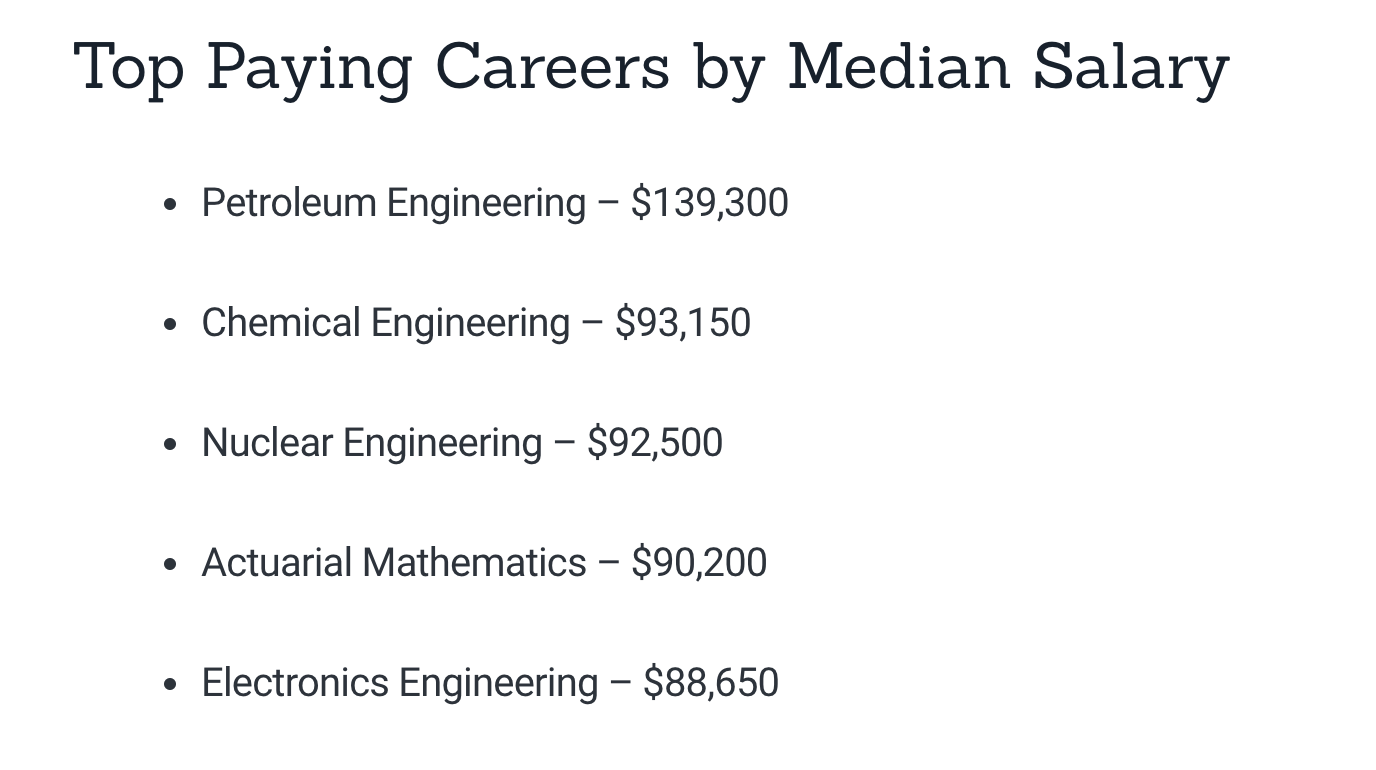I’ll be blunt. If you aren’t planning to major in a STEM field—science, technology, engineering or mathematics—avoid college. I’ll go further. If you plan on majoring in a broad STEM subject like biology or anything remotely considered a social science, also skip out.
The first time I tried to do college, I failed miserably in 3 semesters. It wasn’t until I was 28 that I’d try again. I graduated at age 33 with a degree in physics. However, I don’t use my degree for much of anything these days but I still earn a great living.
I realize many successful people majored in non-STEM fields. There are also unemployed engineers. These are the exceptions rather than the rule. For the average person, college is a raw deal. Here’s why.
1) Crushing student loan debt
Consider the following numbers from Valuepenguin.com on the average total cost of a four-year university. Included in these numbers are room and board, transportation, books and supplies, and other expenses that are typically incurred in route to a bachelor’s degree:
- Average Total Cost of Public Colleges: $25,290 (in-state) $40,940 (out-of-state)
- Average Total Cost of Private Colleges: $50,900
- The majority of students pay between $6,000 and $15,000 in tuition for both public and private schools in the United States.
While you can technically opt out of room and board at many universities, most colleges force students to live in campus housing during their first year (and many beyond that). It’s sold as the ability to get the true college experience by living with other college students and participating in various extracurricular activities, but you don’t really have a say in the matter.
You have to pay this and the only way around it is to attend a community college and get an associate’s degree.
Although you’re saving money if you take this route to getting your college education, it’s not like two year universities are that cheap. According to the studentdebtrelief.us, the average cost tuition at a two-year university in the United States is just $3,570. No matter how you get your college education, you’re going to pay for it. Also, an associate’s degree by itself doesn’t carry significant weight (for reasons I’ll discuss below), so to make getting one worth it, you have to finish your last two years a more costly 4 year university anyway.
That’s how I finished college. I went Beaver County Community College before transferring to Duquesne University. Honestly, if I could do things over again, I’d have probably went to a vocational or trade school. The return on investment is much greater, as they not only pay you to learn your craft, but there’s a fairly high demand for your services.

If you insist on going the college route and being suckered into the college experience and all the extra costs that come with it, it’s going to cost you. Either your parents will foot the bill or you’ll have to borrow it. You’ll end up repaying the cost of a house when you factor in the student loan interest. Given the STEM field being studied, surefire employment after college may justify that expense.
On Collegechoice.net there’s a list of the 25 highest paying careers for college graduates. Only two (Aviation manager and construction manager, numbers 22 and 24, respectively) weren’t in the STEM field. To put that in perspective, U.S. news compiled the 10 lowest majors, and while there are some sciences, there are no fields in technology, engineering, or mathematics.

I told you to avoid the “S” in STEM. The crazy thing is that despite the difference in starting and median salary, all of the roughly cost the same.
Consider the cost of your desired lifestyle on top of those monthly loan repayments. If you’re paying a full mortgage for your education, you might not be able to afford a second mortgage if you want to buy a house. You may not even be able to get an apartment. That means you’re likely going to be living with your parents or sharing an apartment with roommates for the next ten to fifteen years.
Consider some of these quotes from this Guardian article about real world experiences with student debt:
- “The biggest sacrifice I’ve made is moving in with my mother. I’ve also put off seriously considering buying a house for a very, very long time.”
- “I regularly have to choose between fixing my old beater car, paying my health insurance or making my loan payments. I live with several roommates and buy my groceries at Walmart. I can’t afford a gym membership. I know I will never be able to buy a new car or a house within my adult life, a fact that makes me regret going to college as a whole.”
- “Now, I find breakfast is a rare sandwich off the dollar menu at McDonald’s, and lunch is something similar if I can afford it at all.”
What if you want to get married? Try saddling your new partner with your massive burden. And if they have their own student loans, that’s two mortgages on you already. How do you plan to add a third mortgage to get a home? And let’s not even talk about adding the cost of children.
The brutal truth is that unless you have a STEM degree salary, you aren’t going to make enough to comfortably deal with that financial burden. And that’s if you can find work that relates to what you studied. Which brings us to the next problem.
2) Surprisingly few job prospects
When it comes to finding jobs, I’ve got good news and bad news.
The good news is there are a lot of jobs out there.
The bad is that you can’t get the good ones without STEM or training in a trade (carpentry, HVAC, plumbing, etc.), which typically doesn’t require a degree. Most jobs you can get with your communications, business, or psychology degree, you won’t want because they don’t pay enough or have shitty hours.
The job market leans heavily toward the tech and service industries. If you don’t have a STEM degree or aren’t involved in one of the skilled trades, you are almost certainly going to end up in the service industry or some low-level administrative work not worth mentioning. Either way, you aren’t going to make enough money to afford much of a life or pay off that heavy debt that was disguised as “financial aid”.
Good-paying non-STEM jobs simply don’t exist in large enough supply to support every college graduate’s dreams. Even if they did, many people don’t have the aptitude or interest in many of those fields to study them anyway. Some may land a job in their field, but most will be left every month wondering how they’re going to eat.
Some years ago, I worked at a Starbucks and learned a secret they don’t tell you in school. I was a twenty-one-year-old barista making $7.25 an hour. Most of my fellow baristas made $600 a month plus tips. And every one of them, with the exception of one girl younger than me, had a college degree. In fact, two of my co-workers had master’s degrees.
How does this happen? Half of the issue is students majoring in bullshit fields. You don’t get paid for underwater basket weaving no matter how many doctorates you hold on the topic. The other half of the issue is the overabundance of college-educated people.
Think about it. If everyone goes to college, degree holders no longer stand out. That means a degree is worth about as much to an employer as a high school diploma was thirty years ago.
If you’re still determined to attend college, your degree needs to be in something rare and difficult (like STEM). Otherwise, you’ll end up competing for the low-paying jobs left over. And those jobs now have two pools of applicants—those without degrees and those with.
The slim bright side here is that applicants with college degrees are more highly desired. Usually employers see a degree as proof you can stick to busywork without too much supervision. It’s like a gold star at the top of your sheet. Can complete tasks! Congratulations . . . your degree helped you get the job. It’s still a shitty job though. Stay on that career path for the next two decades, and you might have a shot at earning the kind of money that STEM kids do right out of school.
3) You don’t develop technical skills
You need skills to pay your bills, period.
College may grant you a pretty piece of paper, but it will not teach you skills. Let me say that again: College will not teach you skills. You’ll memorize information, pass tests, and prove you can do busywork, but you won’t emerge from college ready to earn a living. Your knowledge won’t even be in high demand unless you choose a STEM niche with low competition for jobs. And that knowledge you paid for is likely already out-of-date because college textbooks tend to be way behind the times.
Think about it. You’re paying six figures for information you could have looked up on the internet. Good luck finding a job to pay that back. As the baristas I worked with learned the hard way, there are no guarantees. Memorizing facts doesn’t do much in a society already overflowing with available information at the touch of a button.
On the flip side, Google is famous for hiring programmers with no formal training. You no longer need to formally study computer science to get paid like a computer scientist. All that matters is that you develop critical thinking skills that guarantee decent salary. A piece of paper, however nice it looks framed and hanging in your parents’ home, will not.
Focus on building your skills, and you’ll be miles ahead of college graduates who assume a degree opens the door to a dream job (it doesn’t). So learn how to fix electronics. Program a computer. Repair a car. Do plumbing or carpentry. Speak and write in a foreign language. Each is a real, marketable skill. Like the harsh truth about life after college, you won’t learn it while you’re there.
4) You don’t develop social skills
Here’s the harsh reality on most college campuses today. Everybody drinks. Parties. Fucks. Your entire peer group lives in close proximity four or more years, but no one really learns to be social. It’s an extension of the high school social dynamic except nobody is sober. People stumble into one another, hang out, and drink or do drugs together. And they imagine this is legitimate friendship.
It’s amazing how weak most people’s social skills are when you get them away from the college bar scene. College will only make you great at being semi-functional while holding your liquor. It won’t improve your networking with important people, help you build meaningful friendships, or teach you how to successfully hit on girls.
Every adult reaches a point where they have to start cultivating social relationships with intention. College delays this social growth and tricks people into believing life is just about being casual friends with the people around you. Avoid this trap at all costs. Who you know is often more important than what you know. Networking is life, and college teaches you that networking takes too much effort.
Listen, I know the social pressures to attend college. But there are so many more productive things you can do instead. You can master any number of trades. You can learn programming. Write online for freelance clients. If you’re charismatic, go into sales. Even if you lived like a bum for five years while teaching yourself music, you’d have solid skills.
Add a few social media tricks to that talent stack, and you can build a following online to sell your talent to. At least you wouldn’t be buried in debt. And if you have no particular talents, you can enlist in the armed forces, see the world, learn some skills, and earn more than Starbucks employees.
Whatever you want to do, there’s an opportunity for you. Unless you’re a math and science wiz, college won’t help you seize it. Society pushes the lie that higher education is an integral step to achieving your dream. That if you don’t go to college, you haven’t experienced real life. Complete bullshit.
What you should do instead of going to college?

Considering the
- Monetary investment required to attend a four-year college
- Lack of jobs available for most degree programs
- Way it destroys your ability to think critically
- Way it ruins your social ability
What should you do instead?
Anything to gain life experience and learn how to function in the real world.
Learn a foreign language. Start a business. Get an entry-level sales job and work your way up. Create your own coursework and curriculum for life by trial and error. The problem with college–even in the STEM degrees–is that real life does reward you for how well you listen or how many correct answers you get. It rewards you for results.
Take an indefinite gap year before you commit to college. I personally recommend that you don’t enroll in college until you’ve at least figured out how to make money in anyway but just exchanging your time for money. For example, this means you could:
- Start a business
- Freelance
- Teach something you’ve learned
- Compete professionally
- Write books
- Build websites
Any of these accomplishments will teach you the value of living by the fruit of your results and give you a much better perspective for gauging the value of a college education. You may still decide to spend the money, but you’ll at least have real world experience and be able to properly determine the correct course of action.
However, the reality for most people is that college wrecks them financially without providing the means to earn a living. There are options, many lucrative, that don’t require a pretty piece of paper signed by a guy that you’ve never met.
A quick recap of the 4 reasons why you shouldn’t go to college:
- Crushing student loan debt
- Surprisingly few job prospects
- You don’t develop technical skills
- You don’t develop social skills
If you legitimately want to better your life, don’t go to college.




